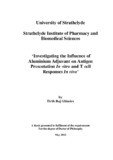Please use this identifier to cite or link to this item:
http://archive.nnl.gov.np:8080/handle/123456789/426| Title: | Investigating the influence of aluminium adjuvant on antigen presentation in vitro and t cell responses in vivo |
| Authors: | Ghimire, Tirth Raj |
| Keywords: | Aluminium adjuvants T cell |
| Issue Date: | 26-Feb-2018 |
| Abstract: | Aluminium adjuvants (Alum) are the only widely approved adjuvants used in human vaccines, although their mechanism of action remains controversial. It is generally accepted that adjuvants mediate their effects on the adaptive immune system cells via innate antigen presenting cells (APCs), in particular dendritic cells (DCs). In this study the way in which Alum modulates several steps in DC functions that lead to T cell activation to underpin adjuvant function was investigated. Using EαGFP/YAe, it was demonstrated that Alum increased the rate and magnitude of antigen internalisation in an actin-dependent manner by DCs in vitro. It was observed that Alum caused an initial reduction in presentation compared with soluble antigen, but eventually increased the magnitude and duration of antigen presentation that was associated with reduced protein degradation in DCs. Using costimulatory-independent-DO11.GFP hybridoma, it was shown that Alum enhanced presentation of antigens derived from protein as well as peptide. As well as having an antigen targeting effect on DCs, this adjuvant works by mechanism(s) other than simply antigen delivery as adsorption to Alum is dispensable for boosting their antigen presenting efficiency. Alum enhanced DC activation characterised by the enhanced expression of CD86, CD80 and OX-40ligand (L) and the production of interleukin (IL)-1β, tumour necrosis factor (TNF)-α and IL-6. In in vivo studies employing adoptive transfer of transgenic T cells and subcutaneous (s.c.) injection, Alum caused a sustained accumulation of cells leading to draining lymph node (DLN) shutdown. In conclusion, it was shown that the dynamic alterations in phenotypic and functional changes underlie enhanced DC function in response to Alum. Due to increasing demand for novel adjuvants, a clearer understanding of the mechanisms that allow these important agents to affect adaptive immune responses will make a significant contribution to the rational design of future vaccines. |
| Description: | A thesis prresented in fulfilment of the requirements for the degree of Doctor of Philosophy, Strathclyde Institute of Pharmacy and Biomedical Sciences, 2012. |
| URI: | http://103.69.125.248:8080/xmlui/handle/123456789/426 |
| Appears in Collections: | 600 Technology (Applied sciences) |
Files in This Item:
| File | Description | Size | Format | |
|---|---|---|---|---|
| Dr T Ghimire Thesis.pdf | 4.1 MB | Adobe PDF |  View/Open |
Items in DSpace are protected by copyright, with all rights reserved, unless otherwise indicated.